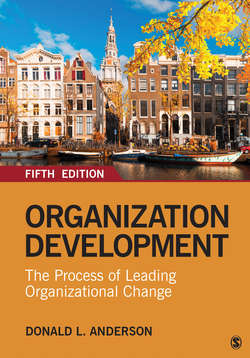Читать книгу Organization Development - Donald L. Anderson - Страница 60
На сайте Литреса книга снята с продажи.
Questions for Discussion
Оглавление1 List four or five of your own personal values. How do these affect your actions? How do your values relate to the values of OD covered in this chapter?
2 Of the OD values listed in Chapter 3, are there any that you think should carry greater weight than others? Which ones? Why?
3 Think of an organization of which you have been a member. Did that organization model any of the values in this chapter well? How so?
For Further Reading
Gellermann, W., Frankel, M. S., & Ladenson, R. F. (1990). Values and ethics in organization and human systems development: Responding to dilemmas in professional life. San Francisco, CA: Jossey-Bass.
Margulies, N., & Raia, A. P. (1972). Organizational development: Values, process, and technology. New York, NY: McGraw-Hill.
White, L. P., & Wooten, K. C. (1985). Professional ethics and practice in organizational development. New York, NY: Praeger.
Exercise: What Would You Do?
Consider the statement of ethical guidelines for OD practice in this chapter’s appendix. What do you think a practitioner should do when confronted with these scenarios? Identify the item(s) in the ethical statement related to each situation.
1 You have learned of a possible project that would allow you to practice your new OD skills with a nonprofit organization. While you have not led a workshop like this before, you are enthusiastic about the opportunity, and this could be a great career move that would also help a deserving organization. You would agree not to charge the group for your services. What ethical considerations exist for your participation? Would it matter if this group would compensate you for your time? Would it matter if this was a private company and you were already employed there?
2 As the manager of corporate quality, you ask members of your staff to interview 15 key stakeholders to determine their support for a new training initiative. Your staff summarized the data for you and reviewed the summary in a staff meeting. It becomes clear that two of the executives are strongly opposed to the initiative, and two are strongly in favor of it. It occurs to you that you could benefit from knowing who the supporters are so that they could convince the opponents to support your initiative. What ethical considerations exist in this situation? Can you ethically ask your staff to share the names of the supporters? What if your staff offered no promises of anonymity to the interviewees? Would it matter if the subject was a sensitive one?
3 As a favor to a friend who manages a small team of six professionals, you agree to facilitate a team meeting. Fearing that the meeting would become contentious, your friend asks you to steer the discussion away from several issues that she knows will cause an argument. Knowing that these conflicts are the source of the team’s troubles and are necessary discussion points to help the team improve, should you bring up the issues anyway and help the group resolve them, or should you heed your friend’s request?
4 You are the director of operations for the emergency department of a local hospital. Recent state regulations now mandate that certain paperwork be completed before and after each patient’s visit, and you have redesigned the intake processes to adjust for these requirements. You need the administrative and nursing staff to be on board with these changes, and you know they will be resistant. How might OD values of participation, involvement, empowerment, collaboration, and openness suggest what to do next?
Appendix
